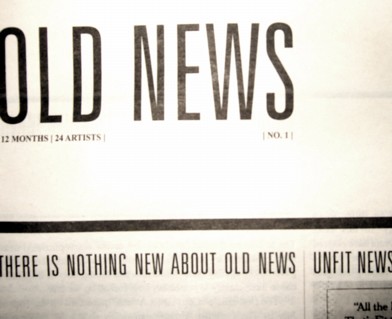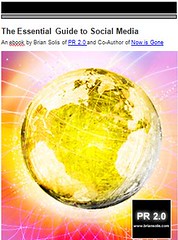Newspapers are Old News

Credit
As a follow up to my post, "Extra Extra, Read All About It! Newspapers Respond to the Social Web," new research emerges that documents the looming exit of print newspapers as a primary source of national and international news.
According to the Pew Research Center for the People & the Press, a new survey indicates that 40% of respondents claim the Internet as their primary source for national and international news, versus 24% in 2007. In comparison, 35%, up 1% from 2007, rely on newspapers and 70% count on television as their main source for news, down from 74% in 2007.
Perhaps the harbinger of things to come is embodied in the response from Americans under 30. A staggering 59% indicated that they get most of their news from the Internet, up from 34% in 2007. In the group, television tied with the Internet at 59%, but for broadcast TV, it's a steep decline from 68% in 2007. As Dan Farber of CNET points out, these figures add up to more 100 percent because people have the ability to offer multiple answers.


Clearly, printed newspapers as well as television are under tremendous pressure to reinvent themselves in the social economy. It's not just about the socialized mechanisms and channels to source and broadcast news however, a successful metamorphosis requires the creation of an active and enlivened community supported by a profitable business model.
As I've stated previously, through social networks, blogs, and micro communities, consumers have access to information literally as it happens. Their peers become sources for news and information, reinforced by social frequency and reverberation. Twitter, Facebook, FriendFeed, and other networks ARE emerging as trusted and oft referenced newsfeeds. And, they're fueled by immediacy, brevity, and connectedness.
You can download the study as a PDF here.
UPDATE: TechCrunch reports that content sites brace for 50% revenue loss
Connect with me on:
Twitter, FriendFeed, LinkedIn, Tumblr, Plaxo, Plurk, Identi.ca, BackType, Jaiku, Social Median, or Facebook
---
Subscribe to the PR 2.0 RSS feed.
---
business news pew information content micro community social+media social media media2.0 media+2.0 tv television broadcast newspaper print pr+2.0 pr2.0 twitter












5 Comments:
From gathering around the radio and listening, to taking the perspective of voyeur and watching, to now actively participating has brought a new richness of opportunity; consumers get it, hopefully newspapers will jump in and find a way to evolve and become participants in the give and take.
Another great post.
For a really thoughtful discussion on this, see the blog by newspaper/TV CEO Chuck Peters at http://cpetersia.wordpress.com/.
Saying people get their news "from the Internet" begs the question of the caliber of information they're finding--the good, the bad and the really, really wrong are all posted there by someone, with or without a judicious editorial eye.
That editorial function still adds value, which concerns me as newspapers die. This study doesn't address local news, which is where daily papers really added value all along, and that concerns me even more. How will citizens know what government, business, and nonprofits in their region are doing if they're reliant on the perspectives of volunteer part-time bloggers?
For those of us doing public relations, we're distributing directly to the public now. I still get occasional contacts on news releases that are over 5 years old. It changes the role in media relations from being someone who works with the media to being someone who works directly with the media-consuming public, as well as with reporters.
That direct consumption is great for me as a public information officer helping get my institution's work out to the public--less great for me as a consumer, awash in information put out by people motivated to sell me something.
@BarbChamberlain
Hi Brian, coincidentally I too have just reviewed the Pew Research findings over at my blog. I hope it compliments your post.
Death of the newspaper and rise of social media
While the physical newspaper may be in decline, that which is 'traditional journalism' won't fade so quickly. Here's why...
1) 'citizen journalism' still has a ways to go for unpaid sources to become trusted. That's not to say they aren't, but accuracy and even accountability are still in a very nascent phase.
2) SM communities tend to be self regulating in a 'natural selection' type way. This does mean, however, that there will be content to be filtered out by the reader and when we're becoming increasing overwhelmed by content overload.
3) Much of the SM space depends on users being proactive in their search for info. Yet for the foreseeable future (i.e. at least a couple of generations) the majority of the population won't want to 'hunt and peck' for news, but will turn to aggregation sites (likely to be the re-incarnation of the traditional media simply using a SM vehicle instead of 'hard copy'). Furthermore, many of these people will be willing to buy subscriptions to these (whether payment will be $$ or voluntary sharing of info to the sites and therefore their advertisers).
4) The complete 'loss' of the hard copy intimates ubiquitous use of 'smart phones' and their ilk. However, the majority of the population does not yet have these devices (recently I heard that smart phones made up only around 15% of the cell phone market in Canada). At most they can only access online (including SM) content from a home or work computer. Eventually there will be a tipping point, but we're not there yet.
The vehicles that the traditional media have used are changing. Of that there is no doubt. But the media - and the requisite journalism/editorial/analysis/commentary that comes with it - will soldier on. At least those 'outlets' willing to change with the times will.
And just where does that news on the Internet come from? The Pew study doesn't say. What's likely? That is was produced by traditional news organizations like newspapers, television, the AP. (Remember, the study concerned national and international news.)
Sure,many of those stories were passed along on social media. So what?
The question isn't really whether newspapers and other traditional producers "get it". Distributing the news is easy. Post a good story and it'll get around.
Making money on the Web to pay professional journalists is more difficult.
And, to expand on Barb's comments, without those journalists, what's left? Will Twitter really help us understand the implications of exploding violence in Mexico or the resurgence of nationalism in Russia or the power of the Chinese economy?
Post a Comment
<< Home